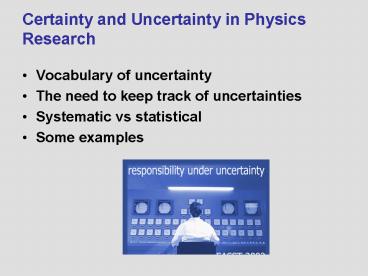Certainty and Uncertainty in Physics Research
1 / 8
Title:
Certainty and Uncertainty in Physics Research
Description:
Each time you measure something, try to repeat it and analyze the distribution of results ... Draw you conclusions based on your findings and on your uncertainties. ... –
Number of Views:20
Avg rating:3.0/5.0
Title: Certainty and Uncertainty in Physics Research
1
Certainty and Uncertainty in Physics Research
- Vocabulary of uncertainty
- The need to keep track of uncertainties
- Systematic vs statistical
- Some examples
2
The vocabulary of uncertainty
- Accuracy is correctness closeness to the truth
- Precision is relative uncertainty
- Error can be, without qualification, interpreted
as a mistake (AKA blunder) - Error can also be a type of uncertainty.
- Uncertainty is a measure of being unsure it
gives a probability of being close to the truth
3
Some examples of sentences
- The calculation is accurate to 3 decimal
places. (this means, not accurate at 4 or more) - measured to 3.2 ppm precision. (this is how
relatively well the authors think they have
determined the quantity) - The error from reading the dial is 0.2 V (this
is not an uncertainty, this is an incorrect
reading, a bias, which can be corrected for if it
is understood) - The uncertainty in the reading of the dial is
0.2 V. (this is a systematic error, to be
included in the final quoted result) - Systematic and statistical errors are combined
in quadrature. (see later, but possible if
there is no correlation)
4
Things to consider as you perform your summer work
- Each time you measure something, try to repeat it
and analyze the distribution of results - This will give you a feeling of the
reproducibility of your equipment or technique.
If its really good, you dont have to keep doing
this. If it varies a lot beware of physics
conclusions you draw - If you are doing statistical work for your
summer projects, learn some of the basics - There are many books (e.g., Bevingtons Data
Reduction and Error Analysis for the Physical
Sciences) and I wont go through these issues
today - Next semester, your senior theses should discuss
the uncertainties associated with your work. - Plan to keep track of these as you pursue your
summer projects (use your new lab notebooks!)
5
In more detail
- Keep track of where the uncertainties are in your
project as you go - Are they in the assumptions associated with your
model? - Are they in the alignment of the apparatus?
- Are they in the counting statistics?
- Are they in the reproducibility of performing the
same procedures? - Are they in the optical element quality?
- Are they in the backgrounds?
- For the Fall Include a discussion of these
issues in your senior theses - We can discuss what you find together
6
Systematic uncertainties
- Laser alignment
- Laser power stability
- Optical alignment
- Temperature and equipment drift vs T
- Differences in sample quality
- difficulty in not having homogeneous solutions
of nanoparticleseach one differs a bit from the
last - etc., etc.
7
Statistical errors
- Books exist on handling these and many recipes
exist for propagating uncertainty - Data Reduction and Error Analysis for the
Physical Sciences, P. Bevington and K. Robinson,
McGraw Hill - Particle Data Group,
- Generally, is a benchmark to keep in
mind as uncertainty - Final errors often combine statistical and
systematic - Can it be done in quadrature ?
- This only works if the sources of errors are
uncorrelated.
8
Conclusions
- Like it or not, your work has uncertainty
- Identify it
- Describe it
- Draw you conclusions based on your findings and
on your uncertainties. - INCLUDE a discussion of this in your thesis and
in your future scientific writing































